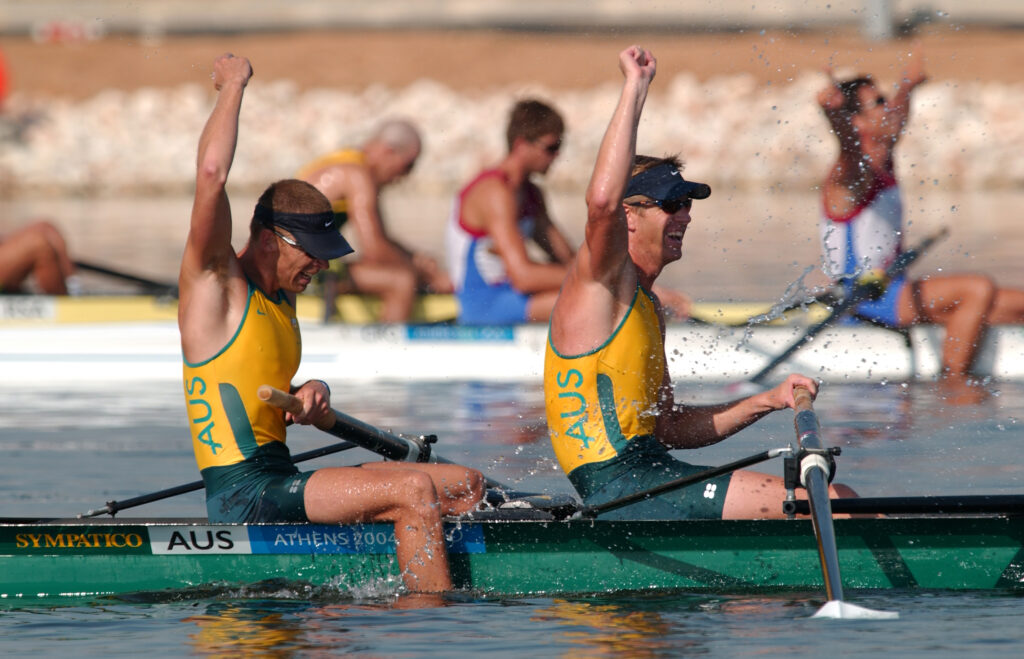
01 Oct 2022
Where are they now? Duncan Free
Duncan Free may have started rowing at just 12 years old and he may have continued for the next 30 years and then he may have stayed involved after retiring from top level rowing, but he still has a stand out memory. The 2008 Beijing Olympics. He rowed in a pair with Drew Ginn. They won Olympic gold.
Free adds as another stand out memory that shows the extent of his career – racing a double at the Worlds in 1997 with his brother Marcus and their dad coaching. They got the bronze medal.
Free’s father rowed for Australia. “That’s how I got into it. We lived on the water when I was younger. Dad had his old wooden single beside the house. When I was about 12 I jumped in the boat and he started coaching and it just went from there.”

Free continued to row out of his back yard through to making the Australian national team. He joined a club because he had to, to enter races, but the back yard water way was predominantly his rowing home.
Two Olympic medals and four World Championship medals later and aiming for the 2012 London Olympics, Free was forced into retirement.
“I had a nasty cycling accident in 2011 which broke my leg in 15 places. I was selected in a four that year and was ruled out for that. It was very challenging getting back fit enough and learning to walk again.
“I was in a boat before I could walk, but there was one complication, my leg was now 2.8 cm shorter. We allowed for it in the boat. It worked well and I got career personal bests on the erg. I got selected in the four for the London Olympics.
“I then got a stress fracture in the ribs. They had to move on with the four so put me in the pair. I raced at the World Cup and my rib fractured again. I was 39 years old and happy to retire.”
Free says the transition into post-rowing life was easy as rowing was not 100 per cent of his life. He had a job, his family and a circle of friends outside of rowing and had always worked throughout his rowing career as rowing didn’t pay the bills with three kids and a mortgage.
“I did a lot of my (rowing) career with children so I was always working.” Free got into banking and finance out of university and also a director of rowing at a boys school for a few years.
“Straight after Beijing for 3 – 4 years I worked for an insurance investment company, my job was actually wining and dining and presenting and talking and golf days and conferences and guest speaking. My biggest year was about 150 presentations a year. That was fun for a bit of time, but I got sick of it eventually.”
Free says having flexible employers had always been important especially when big training weeks got above 30 hours for the week.
“It wasn’t super easy but it certainly wasn’t challenging or hard. I think I did it pretty well.”
From his rowing years Free sees benefits that helped him later.
“The whole time management and working with a group in a team, but the biggest one for me is persistence and wanting to achieve more and more in the working environment. This includes never being content with where things were at or are at. I’m still like that now. I always want to be better and better.”
Free looks after the elite athlete programme and the high performance programme at Griffith University. His job also includes looking after sponsorships and partnerships.
Rowing remains a big part of his life as Free coaches in addition to work. Two of his children row and one has recently competed in an under-21 trans-Tasman competition.
“The fact that they’re rowing is one of the major reasons I’m down there (coaching) every morning helping out as well. I certainly drive them and motivate them to give it their best.”
There are elements that Free misses about being an athlete.
“I miss being fit. You psychologically feel good when you’re fit. But at the same time I don’t miss the training. I do miss getting on the water and moving the boat well. When you nail it in a boat it’s fun and you just want to do it all day.”
For Free there’s not a lot of time in the boat but he did race the Head of the Charles in 2019 with James Tomkins and a few others. He went for a single scull a couple of weeks ago and whenever he sees glassy water he wants to be out there. “I think it’s in me forever.”
His former injury isn’t a problem.
Free had leg extension surgery in late 2012 to extend the femur. “It was an epic fail.” It dropped back to where it was and he’s still got a shorter leg. Free says, though, he’s adapted to it well.
And what does he think about the shape of Australian rowing? Free sees them in a transition phase especially in coaching.
“I think they did really well at the Olympics. Walking away with two gold medals is a win. I think they’re in good hands.”
In reflection Free adds, “I had a fun career, four Olympics, nearly a fifth. I had a very fun long career. I see the odd bad result and I don’t regret any of it. It was fun and I’m loving still being involved in it now but also glad I’m not training and competing at the top level.”

